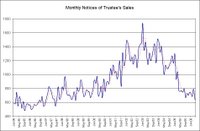Suppose we live in a world with no private automobiles. There are still airports, bus stations, and sea ports, and these are places with diverse carriers and services, giving you many options for traveling long distances to other locations. But to get from your home to these travel hubs, your options are limited to between one and three cab companies; most people have access to two, RBOC Cab and Cable Cab. Both cab companies own all of their own cabs, but RBOC Cab has been legally required to allow independent operators to rent their cabs. Those independent operators have been permitted to repaint the cabs, furnish the interiors differently, and offer additional services to customers within the content of the cabs, but the cabs are owned by RBOC Cab and are of the same size, and the radios are standard equipment owned and maintained by RBOC Cab. Cable Cab, by contrast, has never been required to allow independent operators to use its cabs, and has never done so. (UPDATE 11 May 2006: This is because Cable Cab pays 5% of revenue to local governments as part of their franchise agreement, while RBOC Cab, by contrast, has had government monopoly protection until 1996, has free access to rights of way, and receives government funding via "universal service" fees in order to provide service to rural areas. While Cable Cab funded its own purchasing of cabs and infrastructure, RBOC Cab built its infrastructure without risk as a result of the government support.) They initially didn't come with radios at all, but have recently furnished their cabs with radios.
The rules have recently been changed so that RBOC Cab will no longer be required to allow independent operators to rent their cabs. They've stopped allowing new independent operators to rent cabs, or existing independent operators to take on new customers, and have announced that they will be ending all of the independent operator contracts.
RBOC Cab has also announced that they intend to build larger cabs, in which some of the additional space will be used to provide new services, such as a fully stocked bar, refrigerator, and high-definition television. They will supply all of the contents of the bar and refrigerator, as well as what is shown on the TV, by entering into arrangements with suppliers, whom they intend to charge a fee for the privilege of using the facilities to reach their passengers. Passengers will not be permitted to use the refrigerators to store items that they've supplied, though they will still be allowed to bring along their own cooler, snacks, or video equipment, provided that it fits in the remaining space in the cab (which will be more space than in previous cabs).
Both cab companies reserve the right to deny transportation for certain kinds of items that they consider harmful or dangerous, or which impact their ability to function--items that stink up the cab, that could catch fire or explode, etc.
Cab Neutrality advocates argue that the Department of Transportation needs to create additional regulations which require the cab companies to allow passengers to carry whatever items they want, to use the radios to listen to whatever stations they want (whether the driver likes it or not), to put their own items in the refrigerator, and to allow all snack, beverage, and video providers to make use of the new equipment that RBOC Cabs plans to put into their cabs. They also want to require that the cab companies send cabs at the same speed to every travel hub, regardless of the hub's size or amount of demand for its services (or what the passengers want), and that all costs should be borne by the cab company, not the hub. RBOC Cabs responds by saying that in order to fund the building of the new cabs, they need to be able to charge the snack, beverage, and video providers to use the new equipment (in addition to the fee charged to the passengers, which is not enough to cover the actual cost), but that passengers are still free to bring their own snacks. Cab Neutrality advocates worry that unless they are allowed to bring whatever items they want, they might be prohibited from bringing their own snacks, beverages, and videos. RBOC Cabs have also claimed that they need to be able to build these larger cabs in order to travel longer distances, and suggested that their ability to carry snacks, beverages, and videos over long distances is part of the costs they need to recoup (when, in fact, the long distance transportation of even their snacks, beverages, and videos is provided in the highly competitive environment of the multiple transportation hubs, where there are no issues of capacity and costs per mile are significantly lower).
This is not a precise analogy, but I think it captures the highlights. To make it more precise, I'd need to actually talk about the roads, perhaps making the last mile owned by HOAs that are analogous to RBOCs and cable companies, with the HOAs placing restrictions on the size and type of vehicles that can move on those roads and creating new lanes for their own vehicles, which they want to rent out to third parties or make available for higher priority services that might need them for emergencies.
What's right about "Cab Neutrality" is that passengers want to be able to get to every travel hub and they want to be able to choose what food, beverages, and entertainment they get on the way. But the specific proposals they make are too specific, go beyond these basics, and create limitations in what new services and business arrangements can be developed.
As I see it, the biggest problem here is limited competition among cab companies--a situation which was alleviated to a large extent by the requirement that RBOC Cab lease out cabs to independent operators--a requirement that should have applied to Cable Cab as well. (If we had a way to purchase or rent our own vehicles from competitive sources, all of the worries about what the cab companies might do would be eliminated.)
A requirement on the cab companies that requires passengers to be able to carry whatever they want would have the unintended consequence that some malicious or unthinking passengers would carry items that the cab companies want to prohibit for good reason--harmful and dangerous materials, materials which disrupt service for other passengers. (E.g., spam, malware, denial of service attacks.)
A requirement that all cabs must travel at the same speed means that if I have an emergency where I want to be able to pay more to get to my travel hub faster, I can't do it. Passengers carrying organs for transplant surgery don't get to travel any faster than passengers going on vacation.
A requirement that all costs must be borne by the cab companies (both for transportation to the hubs and for the new cabs and equipment within them) limits the possibilities of new business arrangements between third parties and the cab companies. There might be a possible business model where a travel hub pays a fee to get more frequent cab services, with a lower cost to the cab passengers, subsidized by the long-haul transportation services. Or where video providers can supply services at different costs, with lower-cost services subsidized by advertising revenue.








